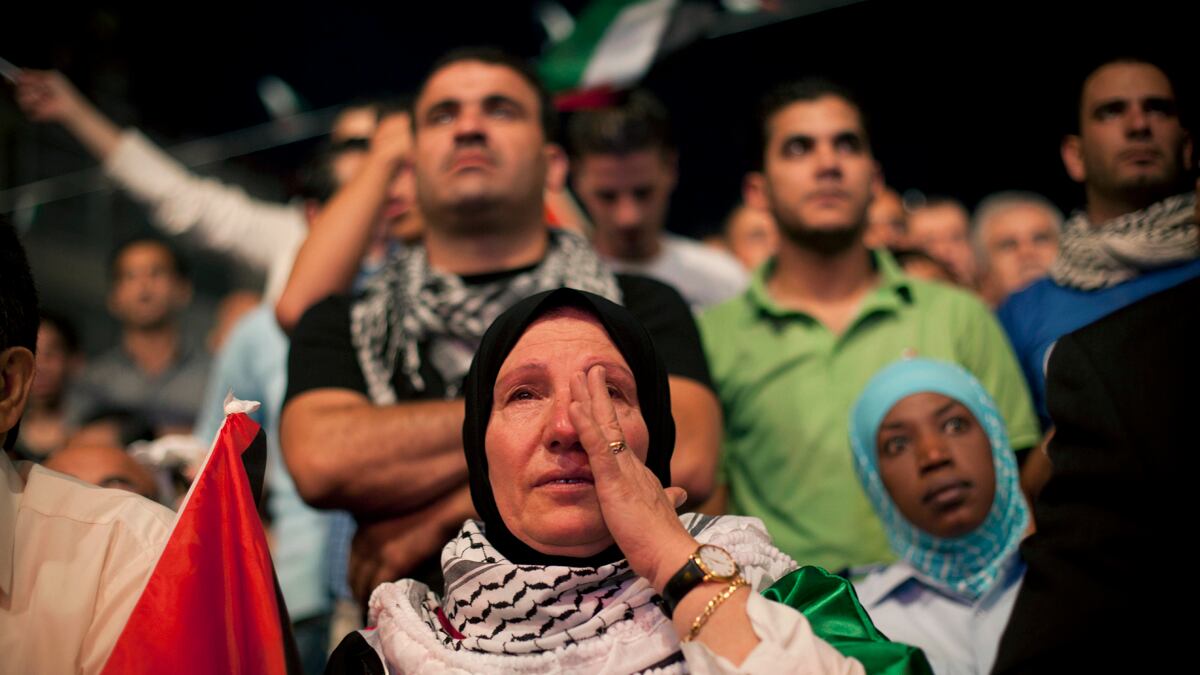Will Palestinian President Mahmoud Abbas’s United Nations campaign lead to another Palestinian uprising in the West Bank and Gaza?
The question loomed large today as crowds gathered across the West Bank to support the bid for U.N. membership and protest Israel’s ongoing occupation. In one incident near the city of Nablus, Israeli soldiers opened fire and killed a demonstrator, according to Israel media. In Ramallah, thousands congregated in a central square to watch Abbas address the General Assembly live on giant television screens.
The drive at the U.N. has created high hopes among many Palestinians. If they are not matched by progress toward independence, analysts have warned, the hopes could harden into frustration and lead to violence—similar to the hostilities that characterized the Palestinian uprising a decade ago.
That’s the conventional wisdom. But there are several key reasons that the U.N. campaign is unlikely to stir a third intifada and—to underscore how events in the region are so notoriously difficult to predict—at least one reason violence might erupt nonetheless.

Firstly, most Palestinians don’t want another violent rebellion. The second intifada, which broke out after the failed Camp David peace summit in 2000, caused thousands of deaths, impoverished Palestinians, and accomplished nothing substantial for their cause. When it tapered off in 2005, stability and economic growth returned to the West Bank—to the tune of 8 percent last year. In an opinion poll conducted this month by the Palestinian Center for Policy and Survey Research, only one in four Palestinians supported a return to armed attacks on settlers and soldiers if U.N. recognition is not matched by Israeli concessions. By contrast, more than half of respondents said they support nonviolent protests and would be inclined to join them.
Palestinian leaders also genuinely believe a return to violence would be counterproductive. Neither Abbas nor Prime Minister Salam Fayyad has the character traits that defined former chairman of the Palestine Liberation Organization (PLO) Yasir Arafat—a compulsive need for chaos and a romantic attachment to the armed struggle. Both are aware that spiraling violence would not only imperil their own achievements, it might sooner or later be directed at them. As a result, Abbas has kept up daily security coordination between Palestinian and Israeli officers even as the U.N. campaign has heightened tension between the two sides. “The PLO and the Palestinian people adhere to the renouncement of violence and the rejection and condemning of terrorism in all its forms,” Abbas said in his speech at the General Assembly.
Israeli military officials seem determined to prevent the kind of aggressive action by soldiers that tends to inflame hostilities—today’s clash near Nablus notwithstanding. Past incidents of violence have often been cyclical: Israelis shoot dead a protester, Palestinians respond with violent demonstrations, requiring more Israeli force and additional casualties. This time around, officers say they’ve been training soldiers to confront protesters—including stone throwers—with firm but nonlethal measures. “The main challenge is not to kill anybody, to contain any violence,” says Amos Gilad, a retired major-general who now serves as a senior defense-ministry official. “We don’t want to see any Palestinians injured or dead. It needs professionalism. We are preparing [for this] for a long time.”
So the optimistic scenario in the aftermath of the U.N. campaign is that Palestinians vent mostly through nonviolent protests and Israelis respond with restraint. But the Israeli-Palestinian conflict is full of surprises. Though some people foresaw a decade ago that a failure at Camp David might lead to a widespread rebellion in the West Bank and Gaza, few predicted it would be so violent and so sustained. This time around, any number of factors could change the picture, including provocations by Jewish settlers, a financial crisis that leads to the collapse of the Palestinian Authority, or simply a few Palestinian extremists bent on militarizing an otherwise nonviolent revolt. Betting on anything in this conflict is always risky business.





